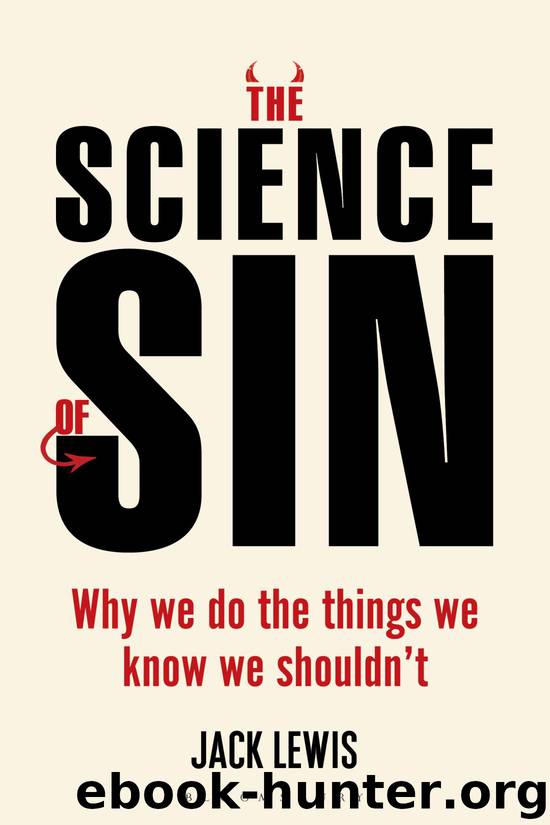The Science of Sin by Jack Lewis

Author:Jack Lewis
Language: eng
Format: epub, mobi
Publisher: Bloomsbury Publishing
Building tolerance to inequity
Given the preference most people have for avoiding the unfair division of rewards across a variety of neuroeconomic games, it seems almost surprising that greed has managed to become such a familiar phenomenon in many modern societies. In the absence of functional imaging studies to illuminate what’s going on in the brains of greedy versus non-greedy people, we’ll have to look elsewhere to establish what the key influences might be that make people deviate from a default preference for fairness.
Several studies have indicated that those with a formal education in economics are likely to keep more money for themselves in economic games, behave uncooperatively and lie more often. Their knowledge of economics may help them formulate rational arguments to make any antisocial decisions made in the context of maximising profit feel justified. This could be achieved in a number of ways. Through practice they may be able to decrease the production of unpleasant social emotions, perhaps by gradually suppressing the AI and/or dACC responses to inequality through repetition. The precedent for such a phenomenon has been set by a recent MRI study that demonstrated how lying can feel less and less uncomfortable the more a person repeats their self-serving behaviour. The dlPFC brain area deactivated by magnetic pulses in the previously described study, which made people more likely to choose the less greedy options, may also be involved. It could provide the source of a signal that suppresses the discomfort that non-greedy people, without a formal education in economics, feel when making greedy choices. However it is achieved, the knowledge of economic theories seems to boost the likelihood of a person opting to increase their own personal wealth irrespective of the cost to others, even if it means being actively dishonest.
Aside from a formal education in economics, being wealthy also seems to have an impact on people’s tendencies towards greed. Having a vast fortune may foster a sense of being insulated from the usual social or legal consequences of getting caught out. Given that the rich can afford the most expensive lawyers, and expensive lawyers routinely help people evade the consequences of any profit-making activities that contravene the laws of the land, this makes sense. Presumably the peace of mind that comes from being able to afford the best legal eagles makes illegal methods of generating or retaining wealth seem less intimidating. And, as we shall see, this isn’t limited to those who grew up in an atmosphere of wealth and privilege.
Take Lionel Messi, for example, the only footballer in the world to have won FIFA’s coveted Ballon d’Or award five times. His father worked in a steel factory and his mother worked on a magnet-manufacturing production line to support ‘Leo’ and his three siblings during their childhood in Rosaria, Argentina. Hardly what most people would call a privileged upbringing by today’s standards. Yet Lionel and his father Jorge (who became his agent when Lionel hit the big time) got into a spot of bother in 2016
Download
This site does not store any files on its server. We only index and link to content provided by other sites. Please contact the content providers to delete copyright contents if any and email us, we'll remove relevant links or contents immediately.
| Administration & Medicine Economics | Allied Health Professions |
| Basic Sciences | Dentistry |
| History | Medical Informatics |
| Medicine | Nursing |
| Pharmacology | Psychology |
| Research | Veterinary Medicine |
The Art of Thinking Clearly by Rolf Dobelli(10450)
The 5 Love Languages: The Secret to Love That Lasts by Gary Chapman(9784)
Mindhunter: Inside the FBI's Elite Serial Crime Unit by John E. Douglas & Mark Olshaker(9317)
Becoming Supernatural by Dr. Joe Dispenza(8199)
Nudge - Improving Decisions about Health, Wealth, and Happiness by Thaler Sunstein(7689)
The Road Less Traveled by M. Scott Peck(7592)
Mastermind: How to Think Like Sherlock Holmes by Maria Konnikova(7320)
Enlightenment Now: The Case for Reason, Science, Humanism, and Progress by Steven Pinker(7306)
Win Bigly by Scott Adams(7183)
The Way of Zen by Alan W. Watts(6600)
Factfulness: Ten Reasons We're Wrong About the World – and Why Things Are Better Than You Think by Hans Rosling(4730)
The State of Affairs by Esther Perel(4711)
Gerald's Game by Stephen King(4640)
Man's Search for Meaning by Viktor Frankl(4576)
The Confidence Code by Katty Kay(4251)
Thinking in Bets by Annie Duke(4216)
The Healing Self by Deepak Chopra(3568)
Hidden Persuasion: 33 psychological influence techniques in advertising by Marc Andrews & Matthijs van Leeuwen & Rick van Baaren(3550)
The Worm at the Core by Sheldon Solomon(3483)
